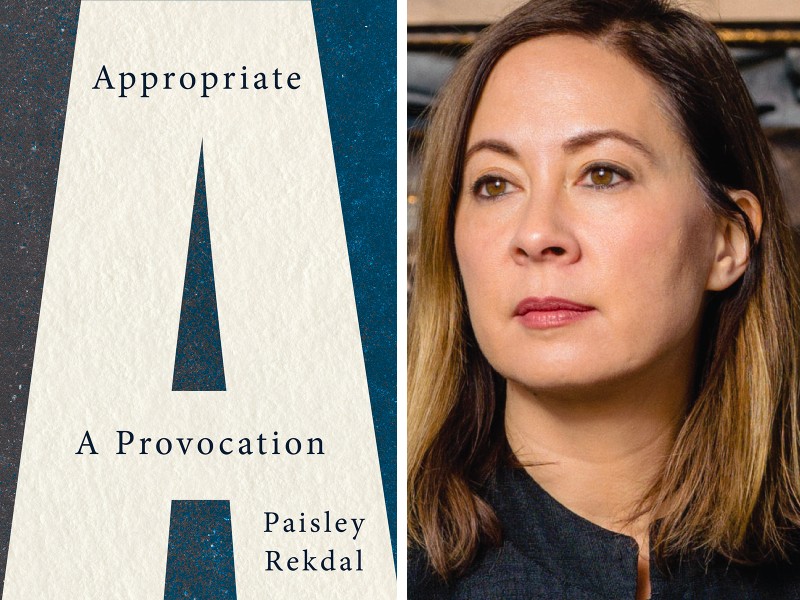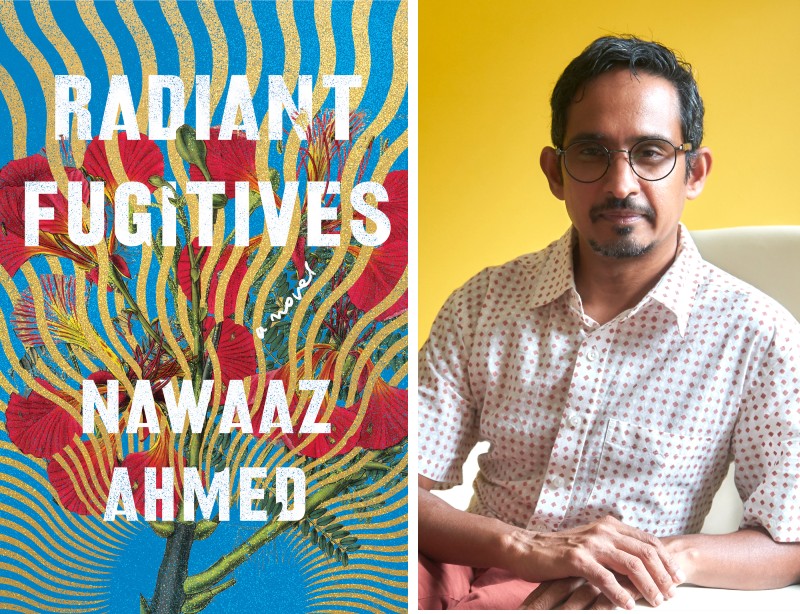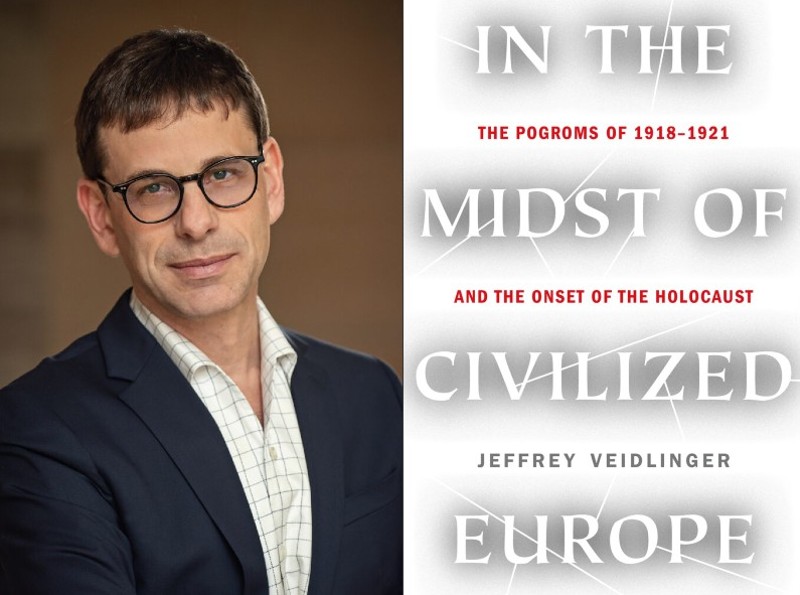Grains, Beans, Seeds, and Legumes: Chef and U-M alum Abra Berens offers recipes and social context for them in her new book, "Grist"

When you start paying closer attention to a food or beverage, you notice more details among different types or brands. Experts who focus on wine or coffee, for example, are able to discuss the nuances and tasting notes of unique varieties.
But those aren’t the only foods and drinks that foodies and cooks can get to know on a deep level.
Abra Berens, a chef, author, former farmer, and U-M alum, brings this level of attention to beans, grains, legumes, and seeds in her new cookbook and guide, Grist. She writes about how her interest in grains took root:
Utah poet laureate and U-M grad Paisley Rekdal considers the implications of cultural appropriation in literature in "Appropriate: A Provocation"

Paisley Rekdal examines cultural appropriation in literature in her new nonfiction book, Appropriate: A Provocation. However, this collection is not essays, as one might expect.
Instead, Appropriate consists of letters addressed to a student who is a new writer, and this structure offers a different, more conversational, and inquisitive tone. This recipient is not based on any specific person but inspired by many students and colleagues. The letters refer to the student as X.
Early on, the first letter defines the subject of cultural appropriation as being about identity. It is also, “an evolving conversation we must have around privilege and aesthetic fashion in literary practice.” Rekdal’s examples of the issue—both positive and negative, including hoaxes in which authors pretend to have another identity—demonstrate how important attention to the topic is.
Rekdal offers ways to understand, analyze, and navigate cultural appropriation. Rekdal asks many questions and also offers a list of them for evaluating one’s own work to let the reader consider what their answers are, too. She includes her own experiences from teaching, participating in conversations, and writing appropriative works herself.
You might be wondering whether cultural appropriation should just be off-limits, but Rekdal brings a more nuanced view, one that acknowledges some literature as effective and other literature as harmful. She writes to X, “When we write books that appropriate the experiences and identities of other people, X, we enter into the system in which we all participate but over which we individually have very little control.” This issue is so risky that Rekdal anticipates this question of “Do you opt-out?” The matter cannot be distilled so simply, though, because Rekdal offers instances when authors successfully write other identities than their own.
The question then becomes about what factors contribute to literature that engages in cultural appropriation working or not working. The answer changes, in part, based on the current moment in history and politics, notes Rekdal:
Empty Mug helps U-M student musicians find a sense of community

Despite the pandemic, music organizations on the University of Michigan’s campus are thriving. Students are yearning to hear music over loudspeakers, dance in sweaty houses, and produce their own songs, and organizations like Empty Mug are here to provide, whether through having concerts, recording live videos, or releasing music.
Fia Kaminski, one of the presidents of the organization, sat down with us to talk about Empty Mug's present, past, and future.
Conversation Starter: Chuck Marshall Unites Local Music Community on "Fans With Bands" Podcast

For Chuck Marshall, a regular morning routine inspired a new creative pursuit.
The Ann Arbor live music photographer and Life in Michigan blogger started listening to different podcasts during his daily pandemic lockdown workouts with wife Brenda Sodt Marshall.
“I really wasn’t on the podcast train until the pandemic came," said Marshall, who works in IT at Michigan Medicine. "I started thinking about how I couldn’t go to shows and how it was fine for me to be talking to a band and asking them questions, but wouldn’t it be fun if fans could chime in with questions or be there and listen?
“The pandemic kinda helped with that because we were using Zoom, and I was like, ‘Oh, I could do a Zoom with this person.’ I realized Zoom records separate tracks of audio, so I could clean it up and get it all nice.”
Race, Class & Miscegenation: Jean Alicia Elster fictionalizes family history in her new young adult novel, "How It Happens"

Jean Alicia Elster’s new young adult novel, How It Happens, chronicles the hardships and inequality faced by Black women from the late 1800s through 1950 and beyond. The story she tells has a personal note. It is the fictionalized account of three generations of Elster’s family, starting in Tennessee with maternal grandmother, Addie Jackson, and continuing in Detroit with her daughter, Dorothy May Ford, and granddaughter, Jean.
The book begins with a prologue that defines “miscegenation,” meaning the marriage, sexual relation, or other intimate affiliation of a person who is white and someone of another race. This topic has a lasting effect on this family when a prominent white man becomes the father of Addie’s daughters. The events that happen to the characters illustrate how race and class work against the women of this family in those eras.
May Ford describes how it happens to her daughter Jean:
Ann Arbor's Linda Cotton Jeffries keeps readers in suspense with her new mystery novel, "Seeing in the Quiet"

Two suspected murders 20 years apart, one of a child and another the death of an old woman. An observant photographer who was a child at the scene of the first murder and documented the second. A killer with a grudge. A kind-hearted detective who is a growing love interest.
These situations lay the foundation for Seeing in the Quiet, a new mystery novel by Ann Arbor author Linda Cotton Jeffries. At just under 200 pages, the plot-driven book moves quickly while the characters try to unravel what happened at each of the potential murders set in Pittsburgh.
Main character Audrey Markum lives with hearing loss, but her sense of sight has sharpened to the point that Detective Rod Rodriguez calls her “Scout” when she is called in to photograph crime scenes. She also is launching her wedding photography business. One case of a suspicious death brings Rod and Audrey closer and closer.
While all of this is happening, Gary Adams, the killer of his son who was the childhood friend of Audrey, is getting released from prison. He knows Audrey’s role in discovering his crime. Audrey finds herself facing multiple dizzying situations: the threat of a known killer, an unsolved murder, and the budding of a promising new romance.
Jeffries has published two other books with AADL's Fifth Avenue Press. I interviewed her about Seeing in the Quiet and writing life.
Nawaaz Ahmed’s characters in "Radiant Fugitives" grapple with identity amidst slow political progress and fallout from their personal choices

What motivates us? What power do we have over the trajectory of our lives? How can people be so close and so far away from each other at the same time?
These questions and many others linger as the story of a divided family and the people in their orbit unfolds in Radiant Fugitives. This first novel by Nawaaz Ahmed, a graduate of the University of Michigan’s MFA program, is told by Ishraaq, who is the newborn baby of Seema, a mother estranged from her family for the choices she’s made. Ishraaq serves as a keen, omniscient observer who understands each person’s perspective and how we are all driven by love or fear or both. This unique position of the narrator shows the reader how each person contributes to events and the emotions surrounding them.
Seema takes on many roles in her life, starting as her father’s star performer in poetry recitations and changing as she falls from his graces. She goes on to come out as a lesbian, work as a political activist, and then marry a man she meets at a protest. Amidst her experiences, the broader climate of political progress with Obama’s presidential election, Kamala Harris’ rise, and expressions of islamophobia emphasize identity politics. The whole time, she struggles to find her place and find acceptance, as Ishraaq narrates:
U-M prof Jeffrey Veidlinger on his book "In the Midst of Civilized Europe: The Pogroms of 1918-1921 and the Onset of the Holocaust"

Jeffrey Veidlinger, a celebrated historian and Joseph Brodsky Collegiate Professor of History and Judaic Studies at the University of Michigan, scoured trial records, official documents, and witness statements to assemble his new book, In the Midst of Civilized Europe: The Pogroms of 1918-1921 and the Onset of the Holocaust, which recounts organized violence against Jewish people in the Ukraine and Poland before World War II.
“For about 10 years, I was a co-director of The Archives of Historical and Ethnographic Yiddish Memories, which involved conducting Yiddish language oral history interviews with elderly folks in Ukraine," he said. "During those interviews, I was struck by people's experiences and memories of the pogroms of 1918-1921 and by the similarities in the ways in which they describe the pogroms and the Holocaust. The interviews impelled me to go back to the revolutionary period and to look more closely at exactly what happened.”
Veidlinger will appear via Zoom to discuss his work at the 34th annual Ann Arbor Jewish Book Festival on November 30 at 7 pm.
U-M's production of Shakespeare’s "A Midsummer Night’s Dream" is all about the love—and the laughs

William Shakespeare’s A Midsummer Night’s Dream is one of the Bard’s most popular comedies and one of the most accessible for modern audiences.
And why not?
It has a little bit of everything for everybody.
There’s 16th-century style rom-com, fairies with magic spells and love potions, and a hilarious troupe of amateur thespians who are preparing a show for a royal wedding.
The University of Michigan Department of Musical Theatre will present a production of A Midsummer Night’s Dream Dec. 2-5 in the Arthur Miller Theater, directed by Vincent Cardinal.
“Why I think it’s popular is that at its core it’s about love and about our impulses to find love and to find people to love and how complicated that is and how it works in the larger structure of our society as well as our personal lives,” Cardinal said. “So it’s examining issues that are core to what it is to be a human being.”
U-M mines Ayad Akhtar's "Junk: The Golden Age of Debt" and the impact of the 1980s bonds scandal

In Oliver Stone’s movie Wall Street, investor Gordon Gekko sums up what capitalism is all about from his point of view: “Greed is good.”
Playwright Ayad Akhtar takes a more nuanced look at American finance in his play Junk: The Golden Age of Debt, a play about the increased investment in high-yield bonds—or junk bonds. Akhtar’s play is loosely based on the rise and fall of financier Michael Milken. In the 1980s, Milken changed Wall Street with his embrace of junk bonds, the idea that “debt is an asset,” and his acquisition of debt-troubled corporations.
In 1990 Milken pleaded guilty to six counts of securities and tax violations. He paid heavy fines and served a greatly reduced 22-month prison sentence. He went on to become a philanthropist, especially noted for his contributions to medical research. In February, outgoing President Donald Trump pardoned Milken.
The University of Michigan Department of Theatre and Drama will present Ayad Akhtar’s Junk Dec. 2-5 at the Power Center, directed by Geoff Packard.
When searching around for a play to direct that would engage University of Michigan theater students and audiences, Packard chose Akhtar’s play for its provocative ideas but also for practical reasons.
The pandemic has had a big impact on the theater program with canceled performances and contact restrictions that have resulted in fewer performance opportunities for students,
“I was told to book a big play that would fill the Power Center,” Packard said. “So the first place I went was to a directory of all the plays that were done at [New York City’s] Vivian Beaumont since this is a similar footprint to the Power Center.”


































